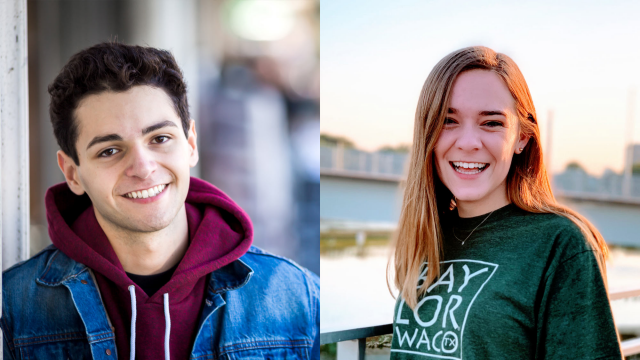By Sarah Pinkerton | Staff Writer
For the second year in a row, the Goldwater Scholarship has been awarded to two Baylor students. Seattle, Wash., senior Andrew J. Munoz, and Plano junior Emily Schultz, both biology majors, were recently granted the award from the Barry M. Goldwater Scholarship and Excellence in Education Program.
The Goldwater Scholarship is given to students in the fields of science, engineering and mathematics and encourages recipients to pursue STEM careers. The scholarship was established by Congress in 1986 in honor of Barry Goldwater, who served 30 years in the United States Senate.
Schultz and Munoz first had to go through an internal competition at Baylor and were then two of four Baylor students submitted in the national competition. A committee then read through the applications and notified Schultz and Munoz about their award.
Schultz was a part of a biology research course her freshman year that replaced regular biology courses, called SEAPHAGES. She now works, alongside Dr. Kelli Barr, specifically with third-term tropical diseases including Zika, Yellow Fever, Dengue and Chikungunya that are prevalent in Latin America, Africa and tropical regions within Asia.
“We’re looking at different pathogenic effects of these viruses. So how they’re transmitted from a pregnant mother to her fetus through the placenta and how these viruses cause neurologic impacts,” Schultz said.
She was one of two fellows at the University of Nebraska-Lincoln, after her freshman year, in their virology department where she did research on the Swine Flu.
During the past summer, she stayed at Baylor to work with Barr on a research project that led to a first-author publication.
“I presented that research at an international research conference in D.C. this past November,” Schultz said. “It was the American Society of Tropical Medicine and Hygiene Conference. By getting that solid research project done between my sophomore and junior year, it really set me ahead for getting a paper published and presenting at an international conference.”
Munoz has worked in labs at John Hopkins University and Boston University and is now continuing his research on cancer-related fatigue with Dr. Elisabeth Vichaya.
He said that this fatigue is a very prevalent issue amongst those going through chemotherapy and radiation therapy, as he focuses on the HPA Axis in the brain. He says that this fatigue is one of the main reasons why people don’t pursue cancer treatment or may not finish it.
“This even goes on after people are cancer-free,” Munoz said. “People still have this fatigue who are not even having cancer treatment and so understanding the biology behind this fatigue, what causes this, why some people are more susceptive.”
As a transfer from George Fox University, Munoz was a part of a student council that represented the biology program to give students outside–opportunities for research and enhance the biology department.
“I created an email that had a list of links of different research programs outside of George Fox that students can find and the resources that I took advantage of when I first started getting involved in research outside of the university and I had that sent out as a mass email to the students in the biology program,” Munoz said.
After coming to Baylor, he joined BURST, an undergraduate research organization, and also runs the general biology journal club which allows him to speak about research that isn’t his own and share different types of research to inspire open-ended discussion.
“It’s very inspiring to go to a university where there’s so many different departments and faculties and groups that are there specifically for the students and want the students to succeed,” Munoz said. “This was even just seen through the Goldwater Committee and the people at Baylor who worked with me and my whole process. They’re very hands-on and step-by-step.”
This scholarship not only shows their ability to research but also to articulate their findings.
“It’s really known everywhere so it’s kind of like a stamp saying, ‘This person does solid research and she’s deemed for good things in the future,” Schultz said. “It really helps me stand out as I apply to graduate school for my Ph.D., this coming year and it’s a really nice confirmation of ‘Yes, this is what I am meant to do and this is something I enjoy doing.’”
Munoz and Schultz both continue to pursue their career goals from home. Schultz hopes to seek a Ph.D in infectious diseases and viruses and Munoz hopes to purse a Masters, Ph.D program or an NIH-funded Medical Scientist Training Program to continue his study of immunology and someday seek out a cure to cancer and improvements for cancer therapy.
“I feel like the advancements in society a lot have to do with STEM-related fields, whether it’s science or engineering and the whole side of it,” Munoz said. “I think it’s kind of the forefront of progressing society in a variety of different ways and especially now during the COVID-19 crisis.”



